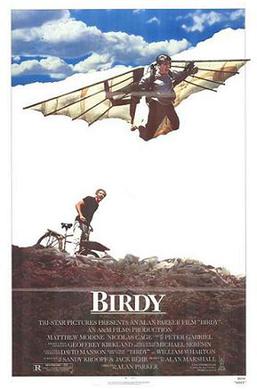Birdy (film)
Birdy is a 1984 American drama film directed by Alan Parker, based on the novel of the same name by William Wharton. The film stars Matthew Modine and Nicolas Cage, who portray Birdy and Al Columbato, respectively, two friends from Philadelphia who have just returned from the Vietnam War. Birdy is obsessed with birds and dreams of flying, while Al tries to help him cope with his mental trauma from the war. The narrative is structured around flashbacks of their teenage years, their experiences in the war, and their current struggles to adjust to post-war life.
Plot[edit | edit source]
The film opens in a military hospital where Birdy is being treated for his psychological trauma, with his face bandaged and unresponsive to the outside world. Al, who has physical injuries, is brought in to try and communicate with Birdy, in hopes of breaking his silence. Through flashbacks, their friendship is explored, showing how Birdy's fascination with birds and flying escalated from childhood into his teenage years, significantly impacting his behavior and perspective on life. The story delves into their experiences before, during, and after the Vietnam War, highlighting the stark contrast between Birdy's escapist desires and the harsh realities they face.
Cast[edit | edit source]
- Matthew Modine as Birdy
- Nicolas Cage as Al Columbato
- John Harkins as Dr. Weiss
- Sandy Baron as Mr. Columbato
- Karen Young as Hannah Rourke
- Bruno Kirby as Renaldi
Production[edit | edit source]
Directed by Alan Parker, Birdy was adapted from William Wharton's novel by screenwriters Sandy Kroopf and Jack Behr. The film's production involved significant challenges, particularly in depicting Birdy's fantasies of flight. Special effects were used innovatively to create the illusion of Birdy flying, a key element that underscores the film's exploration of freedom and escape. Filming locations included various sites in Philadelphia, capturing the essence of the characters' backgrounds and the post-war American landscape.
Reception[edit | edit source]
Upon its release, Birdy received critical acclaim for its direction, performances, especially those of Modine and Cage, and its poignant portrayal of trauma and friendship. The film's innovative use of special effects and its powerful narrative structure were also highlighted. It won the Grand Prix Spécial du Jury at the 1985 Cannes Film Festival, underscoring its impact and significance in cinema.
Themes[edit | edit source]
Birdy explores themes of friendship, trauma, escapism, and the longing for freedom. The film delves into the psychological effects of war, as seen through Birdy's and Al's struggles to reintegrate into society and cope with their experiences. Birdy's obsession with birds and flying serves as a metaphor for his desire to escape the confines of reality and the traumas he has endured. The dynamic between Birdy and Al reflects the complexities of understanding and compassion, showcasing the depths of human connection in the face of adversity.
Legacy[edit | edit source]
Birdy remains a poignant and thought-provoking film that addresses the impacts of war and the power of friendship. Its innovative storytelling and visual techniques have contributed to its status as a cult classic, inspiring discussions on the nature of trauma and the human desire for freedom and escape.
Search WikiMD
Ad.Tired of being Overweight? Try W8MD's physician weight loss program.
Semaglutide (Ozempic / Wegovy and Tirzepatide (Mounjaro / Zepbound) available.
Advertise on WikiMD
|
WikiMD's Wellness Encyclopedia |
| Let Food Be Thy Medicine Medicine Thy Food - Hippocrates |
Translate this page: - East Asian
中文,
日本,
한국어,
South Asian
हिन्दी,
தமிழ்,
తెలుగు,
Urdu,
ಕನ್ನಡ,
Southeast Asian
Indonesian,
Vietnamese,
Thai,
မြန်မာဘာသာ,
বাংলা
European
español,
Deutsch,
français,
Greek,
português do Brasil,
polski,
română,
русский,
Nederlands,
norsk,
svenska,
suomi,
Italian
Middle Eastern & African
عربى,
Turkish,
Persian,
Hebrew,
Afrikaans,
isiZulu,
Kiswahili,
Other
Bulgarian,
Hungarian,
Czech,
Swedish,
മലയാളം,
मराठी,
ਪੰਜਾਬੀ,
ગુજરાતી,
Portuguese,
Ukrainian
Medical Disclaimer: WikiMD is not a substitute for professional medical advice. The information on WikiMD is provided as an information resource only, may be incorrect, outdated or misleading, and is not to be used or relied on for any diagnostic or treatment purposes. Please consult your health care provider before making any healthcare decisions or for guidance about a specific medical condition. WikiMD expressly disclaims responsibility, and shall have no liability, for any damages, loss, injury, or liability whatsoever suffered as a result of your reliance on the information contained in this site. By visiting this site you agree to the foregoing terms and conditions, which may from time to time be changed or supplemented by WikiMD. If you do not agree to the foregoing terms and conditions, you should not enter or use this site. See full disclaimer.
Credits:Most images are courtesy of Wikimedia commons, and templates Wikipedia, licensed under CC BY SA or similar.
Contributors: Prab R. Tumpati, MD

